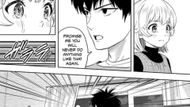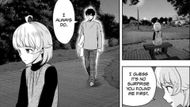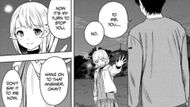When it comes to Witch Watch, readers expect plenty of chaos, laughter, and gag-driven storytelling. But every once in a while, mangaka Kenta Shinohara drops a moment so heartfelt that it redefines how we see the characters.
Chapter 213 was one such turning point. Nico’s open confession to Morihito, while she was still in her “teenage regression” form, has reignited the long-running debate: are Nico x Moi finally heading into canon territory? The short answer is that chances are they could, but the story needs to ensure that Morihito is over his dad phase.

To appreciate the weight of Nico’s confession, we need to revisit the strange path that brought us here. After the big arc where Nico was de-aged into a child, the romance between her and Morihito took a backseat in a way that made many readers uncomfortable.
Moi in Witch Watch was forced into a pseudo-parental role, essentially raising Nico during her regression period. Nico herself never saw him as a father figure, but Moi, ever the responsible guardian, slipped into “parent mode” out of necessity.
This created one of the series’ most controversial stretches. For many fans, the pseudo-parent dynamic cast a shadow over their childhood-friend-turned-romantic-partner's trajectory. Moi’s instinct to protect her became noble, but also emotionally complicated.
Even when Nico began regaining her teenage body and mindset, Moi’s lingering “guardian-first, lover-second” attitude made the idea of romance feel almost off-limits. And yet, the seeds of romance never completely disappeared.
Shinohara gave us the recurring flower-and-bird metaphor; Moi’s feelings for Nico symbolized as a delicate bloom, fiercely guarded by the duties and responsibilities that now defined his life.
The flower was still there, untouched but not gone. That symbolic detail kept the fandom hopeful: Moi’s love hadn’t died, it had just been buried beneath his guardian role.
The “Dad Weirdness” and how Shinohara handled it

Perhaps the most impressive part of Witch Watch Chapter 213 is how Shinohara managed to navigate the “dad weirdness” of the regression arc. For months, fans worried that Nico and Moi’s romance would be permanently tainted by the parent-child dynamic. But surprisingly, Chapter 213 softened those concerns.
By having Nico herself confidently assert her feelings, the series reframed the relationship. Instead of erasing the awkwardness, Shinohara leaned into it, using it as part of the emotional barrier the two must overcome. Interestingly, the result of this was a surprisingly mature exploration of love complicated by circumstance.
Instead of forcing a romance or writing off the awkwardness, Shinohara turned it into narrative tension. And in doing so, he gave readers a reason to keep watching their slow, awkward, but ultimately genuine path toward each other.
Are we entering couple territory in Witch Watch?

The answer is both yes and no. Witch Watch Chapter 213 represents a step forward, but not a conclusion. Nico’s confession opens the door, but Shinohara deliberately avoids giving us Moi’s full answer.
Instead, he asked for time, a narrative stall that allows Nico to return to her proper age and for the warlock conflict to take center stage again. Looking ahead, the plot seems poised to focus on the upcoming warlock confrontation.
Nico is returning home for a month, which gives the story room for training arcs, comedic side adventures, and further worldbuilding. It also conveniently delays Moi’s response, setting the stage for a bigger payoff later.
What fans are expecting in Witch Watch is that once Nico is back to her proper age, Moi will finally reciprocate her confession in full. That setup feels deliberate; Shinohara is clearly teasing us with the promise of Moi’s long-awaited answer.
If Shinohara delivers, we might see one of Jump+’s most satisfying romances, finally giving Nico and Moi the closure they’ve earned since chapter one.
Final thoughts
Chapter 213 of Witch Watch is one of those rare moments where comedy takes a backseat, and emotional honesty takes the spotlight. Nico’s confession, delivered with confidence and maturity, re-ignites the romantic core of the series and places us squarely in couple territory, even if we’re not quite in canon yet.
Yes, the regression arc created awkward baggage. Yes, Moi’s guardian mindset still stands as a wall. But the flower is still there. The love hasn’t gone away, and for the first time, the story feels like it’s building toward an inevitable answer.
